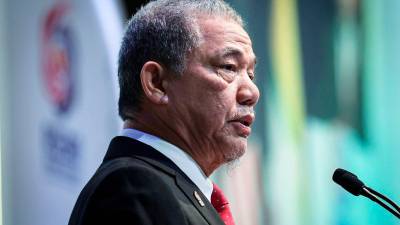KUALA LUMPUR: ASEAN’s pursuit of energy transition, sustainable water management and climate-resilient infrastructure must be guided by environmental, social and governance principles that extend beyond corporate metrics, Deputy Prime Minister Datuk Seri Fadillah Yusof said.
He said ESG should not be seen merely as a reporting tool for companies, but as a framework that shapes government regulations, institutional enforcement and market behaviour.
Fadillah stated, “ESG must be more than a corporate metric.”
He added, “It should guide how governments design regulations, how institutions enforce standards and how markets reward responsible behaviour.”
He made these remarks when delivering his speech at the ASEAN Law Forum 2025 here today.
Also present was Minister in the Prime Minister’s Department Datuk Seri Azalina Othman Said.
Deputy Minister in the Prime Minister’s Department M. Kulasegaran was in attendance.
Secretary Of The United Nations Commission on International Trade Law Anna Joubin-Bret participated.
Timor-Leste Minister of Justice Sérgio de Jesus Fernandes da Costa Hornai joined the forum.
Laos Vice Minister of Justice Ketsana Phommachanh was also present.
Fadillah, who is also the Energy Transition and Water Transformation Minister, said ASEAN needs governance systems that match climate ambitions.
He emphasized these systems must honour social protection and demand accountability.
He elaborated, “To succeed, we need governance systems that match our climate ambitions, honour social protection, and demand accountability.”
Fadillah continued, “This requires justice systems and dispute resolution mechanisms that are accessible, efficient and fair.”
He welcomed the inclusion of ESG disputes in the forum’s agenda.
He described it as a timely platform for ASEAN to strengthen arbitration capacity within global supply chains.
Fadillah noted, “I am pleased that this forum will discuss ESG Disputes and Arbitration in Global Supply Chains.”
He said, “It is a timely platform for us to explore due diligence, strengthen arbitration capacity and equip ASEAN to navigate the evolving nexus of trade, law and sustainability.”
On the broader theme of justice, Fadillah underlined that a ‘just transition’ in the energy sector must be treated as non-negotiable.
He stressed the importance of ensuring fairness and inclusivity in economic and environmental reforms.
He expressed confidence that the ASEAN Law Forum would generate practical solutions to strengthen cooperation.
The forum aims to enhance access to justice and promote inclusive growth across the region.
Fadillah concluded, “When laws are clear, when remedies are accessible, and when justice is delivered without fear or favour, we are not just protecting rights, we are building nations, inspiring confidence and shaping a future where growth and equity walk hand in hand.”
The three-day forum began yesterday.
It is hosted under Malaysia’s 2025 ASEAN Chairmanship.
The event provides ASEAN member states the opportunity to coordinate efforts in building strong and resilient legal institutions and mechanisms.
This is especially crucial for navigating today’s uncertain global economic challenges. – Bernama
